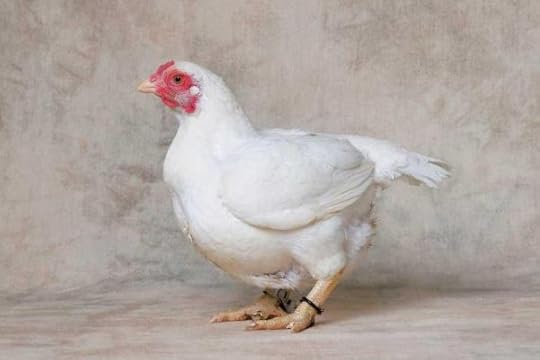Marcy Sheiner's Blog, page 4
February 13, 2015
Baseball Players’ Superstitions
 Baseball just might be the sport with the most superstitious lot of players.��Bleacher Report lists the top 50 strangest. Here’s a sampling:
Baseball just might be the sport with the most superstitious lot of players.��Bleacher Report lists the top 50 strangest. Here’s a sampling:

Jason Giambi puts on a gold thong whenever he’s in a slump.
Moises Alou pees on his batting gloves, supposedly to make ��them tougher, when he is in a slump.
Mark Teixeira ��developed a recent superstition when��a sock of��CC Sabathia���s ��accidentally ended up in his locker, Mark had unknowingly put on one��sock with the correct ��#25,��and��one��with��the #52, and didn’t notice until the game had started; after he had one��of the better games of his career���two��home runs��and six��RBI���s���he decided to don��two��different sox in all��future games.
Hitters often like to get close to their bats. Occasionally this will occur with pitchers as well. Pitcher R.A. Dickey takes his choice of bats very seriously, naming�� each one of them with��creative monikkers.
Turk Wendell, who signed a contract with the Mets in 2000 for $ 9,999,999.99,took 99 as his player number.
Tim Lincecum wore the same cap his first five����seasons in MLB.
Wade Boggs would take batting practice��at precisely��5:17 when plating at night. He would also take ��150��grounders,��no more��and��no less, during warm-ups.
��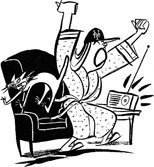 By the way, we fans are just as superstitious: I’m not the only one who worries my team lost because I failed to watch them, or is sure when I’m on the case they’re apt to win!
By the way, we fans are just as superstitious: I’m not the only one who worries my team lost because I failed to watch them, or is sure when I’m on the case they’re apt to win!
Filed under: Baseball, Giants Tagged: Baseball, Bleacher Report, Jason Giambi, Major League Baseball, Mark Teixeira, Moises Alou, New York Yankees, sports, Turk Wendell

February 6, 2015
Everything I know I Learned From Art
Having just watched No God No Master, a 2012 film about the Palmer Raids of the 1920s and, peripherally, the railroading and execution of Sacco and Vanzetti, it occurs to me that everything I know about history I have gleaned from movies, novels, and song lyrics. Before seeing

Sacco & Vanzetti
(Photo: Wikipedia)
this movie, I did not know that Emma Goldman was deported from the US, never to return. I had no idea what the Palmer Raids were, and though I knew about Sacco and Vanzetti, I was fuzzy on the details (though I knew a bit from Holly Near‘s song Two Good Arms.)
This is not the history they teach in American schools���at least, it’s not anything I was taught.
Thanks to Doris Lessing I know something��about colonialism in Africa. I learned about the French Revolution from Marge 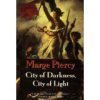 Piercy‘s City of Darkness, City of Light. I know the history of India from dozens of novels by Indian writers, most notably A Suitable Boy by Vikram Seth and A Fine Balance by Rohinton Mistry, and, to a lesser extent, the film Gandhi. Recently I’ve gotten a dose of Nigerian history from Chimamanda Ngozi Adichie. Lest anyone think I’m swallowing works of fiction or Hollywood productions whole, I almost always look up the facts online afterwards; even before the Internet, I did my homework, especially when writing book reviews: I compared Piercy’s details in the abovementioned book to those of historians Will and Ariel Durant���Piercy, who does exhaustive research for her novels, was remarkably faithful to the facts.
Piercy‘s City of Darkness, City of Light. I know the history of India from dozens of novels by Indian writers, most notably A Suitable Boy by Vikram Seth and A Fine Balance by Rohinton Mistry, and, to a lesser extent, the film Gandhi. Recently I’ve gotten a dose of Nigerian history from Chimamanda Ngozi Adichie. Lest anyone think I’m swallowing works of fiction or Hollywood productions whole, I almost always look up the facts online afterwards; even before the Internet, I did my homework, especially when writing book reviews: I compared Piercy’s details in the abovementioned book to those of historians Will and Ariel Durant���Piercy, who does exhaustive research for her novels, was remarkably faithful to the facts.
When I was in my teens, my twenties, and beyond, I read so many books and saw so many movies about the holocaust and slavery that they no longer fascinated but enraged and depressed me, until I finally swore them off; besides, I could probably write up a syllabus for each. Recently I added domestic violence to the list; having worked in a battered women’s shelter some years ago, I don’t need anymore painful education in that department either.
I don’t listen to music, read literature, or watch movies in order to learn, but because it’s what I love to do. Still, it makes me furious that I wasn’t taught important historical events in school, where they just threw dates of wars and generals at us, not to mention lies about our country. It just goes to show that in the end, as Virginia Woolf noted, it’s the artists who’ll save us.
Filed under: art Tagged: Arts, Books, Chimamanda Ngozi Adichie, Doris Lessing, fiction, film, Literature, Marge Piercy, movies, music, Palmer Raids, Sacco and Vanzetti, Vikram Seth

January 23, 2015
Standin’ ‘ With Sly
Promotional photo of Sly & the Family Stone for Rolling Stone, 1970 (Wikipedia)
Stand! by Sly and the Family Stone (1969) is one of the best songs on one of the best albums ever recorded. Tomorrow night a bunch of Bay Area bands will pay tribute to Stand at the Fox Theater in Oakland, following a day-long symposium at which Sly himself will speak; the latter is billed as the first annual convention of The Family Stone. If that sounds grandiose, consider this: The Family’s members were black and white, male and female–a first in rock ‘n’ roll.
Undercover, the extravaganza’s organizer, has produced similar events for outstanding albums since 2010, covering such classics as Paul Simon’s Graceland, Dylan‘s Highway 61 Revisited, and Joni Mitchell‘s Blue. According to their website:
UnderCover Presents is a small grassroots collective that gathers musicians from every corner of the San Francisco Bay Area���s music scene to celebrate the broad influence of classic albums. The concept is simple: bands are invited based on their enthusiasm for the album from a range of musical genres that reflect the diverse styles and cultures that make Bay Area music unique. Each band picks a different song from the album and infuses it with their distinctive sound and personality.
Stand! (the song) epitomizes the times in which it was created more so than any single song of its era. The lyrics, with multiple meanings on the personal, political and spiritual levels, speak for themselves:
Stand! In the end you’ll still be you
one that’s done all the things you set out to do.
Stand! Theres a cross for you to bear
things to go though if you’re going anywhere.
Stand! For the things you know are right
It’s the truth that the truth makes ‘em so uptight
Stand! All the things you want are real
You have you to complete and there is no deal.
Stand! Stand! Stand! (Everybody)
Stand! Stand! Stand!
Ooo-ooh Stand
You’ve been sitting much too long
There’s a permanent crease in your right and wrong
Stand! There’s a midget standing tall
and a giant beside him about to fall.
Stand! Stand! Stand! (Everybody)
Stand! Stand! Stand!
Stand! They will try to make you crawl
and they know wht you’re sayin makes sense and all
Stand! Don’t you know that you are free���
Well at least in your mind if you want to be.
Stand! Stand! Stand! Na na na na na na na na nana
Stand! Stand! Stand! Na na na na na na na na nana
Stand! Stand! Stand! Na na na na na na na na nana
Stand! Stand! Stand! Na na na na na na na na nana
As you can no doubt tell, this is no preachy piece of jargon, but a highly danceable, singalong rocker. The opening drum roll is immediately recognizable, and worth a listen in itself. But hey, don’t take my word for it: if you’re too young to have dug Sly back in the day, check ‘em out now; and if you’re as old as I am, you can come back baby, rock ‘n’ roll never forgets.
And everybody, don’t forget to Stand!
Related articles
[image error] One Classic Album. One Band Per Song. A Bunch of Love for Sly & The Family Stone.
Filed under: Musings Tagged: Joni Mitchell, Sly and the Family Stone

January 2, 2015
Mensch of the Year
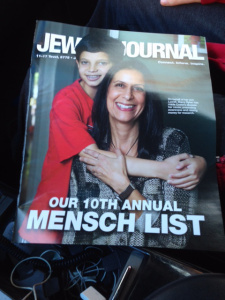
Stacy and Lowell
A bit of clean laundry for the New Year. No, more than that: a bit of nachas, the Yiddish term for happiness, particularly that generated by one’s child.
My daughter was named a Mensch of the Year by LA’s Jewish Journal, a distinction she richly deserves for having turned a difficult and heartbreaking life experience into something useful, starting her own organization to raise money for research into Crohns disease.
Not, I hasten to note, that I deserve any credit: I’ve always said that Stacy was born almost fully formed as exactly who she is—it’s the only way to explain how utterly different from me she was and is. Once, when she was five and I was carting her all over New York State in search of some elusive nirvana, she sat on the back of our U-Haul truck once again with our packed possessions and exclaimed, “I can’t wait till I grow up so I don’t have to live with nobody!”
More recently, when I tried to do something new and different with an advocacy group I worked with and they weren’t interested, I simply left and ceased doing anything. In a similar situation, Stacy started her own group.
Lowell
When my grandson Lowell was diagnosed early on with IBD, specifically Crohns, I thought, as most people probably do, that it just meant stomach aches and dietary restrictions. It turns out to be much more problematic, in some cases, including his, causing chronic pain and fatigue, nutritional deficiencies, delayed growth, and constant crises necessitating invasive medical tests, visits to the ER and hospitalizations, even surgery.
Besides dealing with all that and more, Stacy started running marathons. So did Jonah, Lowell’s older brother.

Marathon runners Stacy and Jonah
I’m thrilled that my daughter has been recognized for her hard work and advocacy of people with IBD, and not just because she’s on the cover of a magazine, though I admit I got a huge kick out of that. The deeper meaning is that a lot of other people will learn about what she’s done, she’ll get energy and kudos, and it will raise awareness of Crohns disease.
As for me, I’m starting 2015 brimming with nachas.
Happy New Year all.
Filed under: Adult Children, Disability, health, motherhood Tagged: Crohn's disease, Disability, health, IBD, motherhood

December 29, 2014
2014 in review
The WordPress.com stats helper monkeys prepared a 2014 annual report for this blog.
Here’s an excerpt:
The concert hall at the Sydney Opera House holds 2,700 people. This blog was viewed about 23,000 times in 2014. If it were a concert at Sydney Opera House, it would take about 9 sold-out performances for that many people to see it.
Click here to see the complete report.
Filed under: Musings

December 6, 2014
CHUMBUG!
The other day I was sitting in a coffee shop in SF minding my own business, being tortured by an endless barrage of sentimental Xmas songs coming through the loudspeakers. It’s time, I realized, to post my annual rant about this irritating, phony, commercial season that’s foisted upon us earlier and earlier every year. Originally a performance piece, here it is:
Chumbug!
So, nu? It’s not enough that I’ve been hocked to death by Xmas for six decades, now it’s Chanukah too?!
Christian America has been trying for years now to pacify Jews with misguided notions of equal time: televised menorah lightings, dreidl dolls with curlable hair, latke dinners at 25 bucks a plate. Children’s books on Chanukah spill from bookstore shelves—I saw one in which Chanukah was interwoven with the birth of Jesus.
I guess it serves us right for draying so much about being excluded: Christians don’t understand our tribal custom of guilt-tripping, which calls for no response other than…well, expressions of guilt! Enough with the Chanukah bushes already! I don’t want Chanukah any more than I want Xmas. Not only is it a minor holiday, it isn’t even politically correct: it commemorates some sort of Jewish war victory. No one used to pay any attention to it, not even Jews. But the more Xmas fever rose, the more obvious the inequality became. (By the way, Xmas as a national disease is about to go official, with the American Psychiatric Association planning to list Xmasphilia in the next edition of the Diagnostic and Statistical Manual of Mental Disorders.)
Xmas deserves that listing: it isn’t a holi-day, it’s an event that lasts from October through January. That’s three months, or one-quarter of the year, or 25% of the time we spend on the planet. I’ve done the math: If I live to 75 I will have spent roughly 18 years coping with the anger, resentment and depression induced by the so-called holidays.
The real tsuris is that I’d finally gotten a handle on it, when suddenly, after years of encouraging me to deny my ethnicity, Christians started pressuring me to become a Real Jew. Carolers arrived at my doorstep singing “O Chanukah” and “Dreidl, dreidl” in four-part harmony, demanding latkes. I received an ecumenical card, “As we celebrate Xmas and Chanukah…” When I objected to the wreath in my office, the person who hung it let loose with an incoherent, sentimental ode to menorahs. Huh?
Fellow Jews, we must act, and fast, before a dreidl decorates every streetlight, and Day-Glo stars of David invoke guilt and capture gelt. We must organize so that come next October, when electronic menorahs play “Little Star of Bethlehem,” we’ll rise up in unison and shout
CHUMBUG!!!!!

This year’s hot item
Filed under: Holidays Tagged: Chanukah, rant, Xmas

November 27, 2014
The Jerry Poems
Riding Up The Thruway
Riding up the thruway
in the fresh October morning
struck by the splendor
of sun and sky and mountains
we pretended we were driving
to Quebec. Beneath my sweater
my nipples pulsated
with yesterday’s rhythms.
I was a lute
a harpsichord
a joyous screaming horn
wailing for your fingers
and your tongue.
No Miles ever played as sweetly
no Coltrane as intensely as you
as you
my fine musician
celebrating passion
upon this throbbing drum.
***********************************
The Same Two Years
“Two years!”
I sob into your shoulder
(your rich round luscious
brown shoulder)
For two years
I cupped delicate dreams
in tentative palms:
an offering.
Take them now,
they are yours tonight
as much as my breasts
and my thighs
for I am afraid
that tomorrow will be
the dawn of another
two years.
Finally you speak:
Time flies.
*********************************
Non-Monogamy
Do you compare us?
Do your hands caress
her sculptured thighs
rejoicing in sensation
my padded flesh denies?
Do your lips delight
in tobacco-free kisses?
Does each layer she unfolds
reveal another of my flaws?
You say there’s no
comparison. You lie:
New lovers are always
antidotes to old.
You say we’re each unique
that you love the one you’re with
but still the question haunts me:
When you compare us, who wins?
****************************
Profile
Your framed profile sits beneath
a bunch of tightly shut anemones.
By the time they blossom
you will lie beside another.
Bloody purples, pinks and reds—
even virgin whites—
will trumpet your
betrayal.
All attempts to hold you
or to leave you have failed.
I watch the tender petals spread
raining seeds upon your photo.
Each one reveals a layered center
brilliantly distinct.
*****************************
I Wanted to Lie In Bed
I wanted to lie in bed and tickle his toes.
He wanted to go out for breakfast.
I wanted to listen to his childhood secrets.
He wanted to hear jazz in the local cafe.
I wanted to read him my poetry.
He wanted to take in a skin flick.
I would have fed him moussaka
had he sat still long enough
rubbed his muscles
with eucalyptus oil
lathered his hair
sculpted his face
with my hands.
Now his absence fills the room
with relief. The air expands.
The horizon of my mind
stretches in the silence like rubber.
He never raised a hand in anger
or even his voice
never asked for commitment
or demanded choices.
He respected my art
fed my cat
was patient in bed
and picked up his socks.
He just never had time
to feel.
********************************
The Last Lap
Swimming towards another shore
I pause to gaze at those behind.
Letting go was never easy
and the pain disguised as pleasure
was seductive.
How I cradled it between my breasts
pretending my yearning sighs
were of contentment.
How I studied our strokes
as we moved through the muck
only to discover
I’d been swimming alone.
Surfacing
I find you bobbing
like a piece of dead wood
surrounded by those
who fitfully grasp
your slippery edges.
It is not you I mourn
in crossing
but the loss of kinship
with the drowning.
*****************************
White Lies
He made me feel rooted
and strong as a tree
wrapped my parched bones
in ebony silk
as if we inhabited
some other planet
but it was America
on Earth 1980
and we had been taught
white lies.
Plotting revenge
we came to despise
what we’d loved.
I curse his virtues
celebrate his faults
read books and theories
on racism.
I’ve forgotten how it felt
to sleep in his skin
and the landscape we crossed
unafraid.

Filed under: Poetry, Writing Tagged: Poetry, Writing

October 31, 2014
Bill Maher, Islamophobia, and Political Correctness
Breaking News! Bill Maher, host of Real Time and the now defunct Politically Incorrect is politically incorrect!
So say students at UC Berkeley, who are petitioning the administration to rescind Maher’s invitation to speak at their December commencement, claiming Maher “is a blatant bigot and racist who has no respect for the values UC Berkeley students and administration stand for.” Over 4000 have signed the petition. To sign a counter-petition, click here.
Maher has been accused of bigotry and racism elsewhere as well, for his jokes and comments on the Muslim religion, to wit: “Islam is the only religion that acts like the mafia that will fucking kill you if you say the wrong thing.” The students’ petition calls this “hate speech.” I call it the truth.
Bill Maher is one of the world’s most ardent atheists, and gives equal time to all religions. As noted on SF Gate, “Maher, along with Oxford professor Richard Dawkins and the late journalist Christopher Hitchens, are among a group of prominent atheists who have taken a no-holds-barred approach in their outspoken disdain for religious doctrine of all faiths.”
As Maher once said, were he alive during the Crusades he’d be raving primarily about Christianity—which he still does—but he’s living now, when ISIS is beheading people. “Islamophobia!” scream his critics.
Well, count me in as an Islamophobe: whether it’s coming straight from the Koran or a perversion of the religion, had I been born in one of many 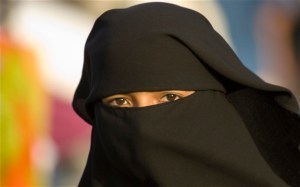 predominantly Muslim countries I’d have to go out covered from head to toe and could be stoned to death for adultery. As a Jew I wouldn’t have visited Germany during Hitler’s reign; as a woman I won’t visit Iran now.
predominantly Muslim countries I’d have to go out covered from head to toe and could be stoned to death for adultery. As a Jew I wouldn’t have visited Germany during Hitler’s reign; as a woman I won’t visit Iran now.
Oh, but the politically correct cry self-righteously, we must respect religious customs! Why? Why should I respect any religion that treats women as pariahs? It’s time we stopped this hands-off bullshit of forgiving misogyny and oppression in the name of religious doctrine. For the record, I’m also critical of Orthodox Judaism for barring women from certain religious ceremonies, the morning prayer in which men “thank God I’m not a woman,” and the baffling, bizaare custom of making women shave their heads and wear wigs. As for the Catholic Church, it continues to ban abortion and even contraception, damaging millions of women (and men, and children) with outmoded, antisex edicts.
Ironically, it’s primarily liberals who toss around this term Islamophobia. “Liberals need to stand up for liberal principles,” Maher said during a round-table discussion. “But then when you say in the Muslim world, this is what’s lacking, then they get upset.”
Bill Maher might just end up with a fatwa on his head, like Salman Rushdie who lived in hiding for years, like the cartoonists who portrayed Allah unfavorably, like the filmmaker who was murdered for doing the same. If that isn’t intolerance in the name of religion, I don’t know what is. Why should we respect it?
Related articles
 Bill Maher under fire: UC Berkeley students petitioning against comedian’s commencement address
Bill Maher under fire: UC Berkeley students petitioning against comedian’s commencement addressFiled under: celebrities, Politics Tagged: Current Events, Politics, rant, Television

October 16, 2014
In Praise of The Egg
My grandfather was an egg candler. What, any contemporary person is sure to ask, is an egg candler?
One who candles or tests the freshness of eggs by holding them between the eye and a lighted candle.
Many of these “highly experienced” people will never work again, not because they are lazy or incompetent, but rather because their job has disappeared. (Wordnik)
One perk of my grandfather’s employment was that his family always had the biggest, freshest eggs, some with double yolks. My grandmother used them in her famous matzo balls, or in potato latkes. I loved going to my grandparents’ fourth-floor apartment on Lydig Avenue in the Bronx, primarily to eat matzo balls, latkes, and chopped liver—all replete with fresh eggs. Sometimes hard pale yellow yolks floated in her chicken soup—some rare permutation of unborn chicks, a delicacy I haven’t tasted since the passing of the above mentioned cook—who, by the way, lived to her mid-eighties, as did her husband, despite scarfing down eggs every day.
or in potato latkes. I loved going to my grandparents’ fourth-floor apartment on Lydig Avenue in the Bronx, primarily to eat matzo balls, latkes, and chopped liver—all replete with fresh eggs. Sometimes hard pale yellow yolks floated in her chicken soup—some rare permutation of unborn chicks, a delicacy I haven’t tasted since the passing of the above mentioned cook—who, by the way, lived to her mid-eighties, as did her husband, despite scarfing down eggs every day.
Perhaps it’s because of my family history that I’m such a big fan of the humble egg. When dietary “experts” told us to forego these precious jewels rife with bad cholesterol they did us a great disservice. I don’t know from cholesterol; unlike an egg, it’s not something I can hold, see or feel. All I know is that eggs are still relatively cheap, can be cooked in endless manner, and are a source of protein and joy.
Once, in Maine, I went on a tour of a big egg farm. This was in the early 1970s, and those keening, mewling chickens were cramped into tiny cages under fluorescent lights; any that escaped were called “renegades” and promptly shot. The experience put me off eggs for a few months, until I began buying my eggs from a woman who kept a few chickens. After doing so for many years, I found I could actually taste the antibiotics in store-bought eggs; now I only buy organic. (Caveat: not just “cage-free” but organic.)
I eat eggs scrambled, fried, poached, and turned into elaborate crispy frittatas loaded with vegetables. My favorite additions to scrambled eggs are mushrooms, scallions and cheddar cheese. I add soy sauce and garlic to an egg while it’s frying, cooking the white crisp while keeping the yolk runny for dipping toast or potatoes. I adapted a dish presented on Top Chef that I frequently eat for lunch: a frozen waffle, topped with a bit of real maple syrup, a poached egg and a slice of melted cheese. Fantastic!
I dream of a better tomorrow…where chickens can cross roads
and not have their motives questioned.–Anon
Apparently you can do your own egg candling at home:

Jiffy Way Egg Candler
Related articles
 Amazing benefits of egg for health & beauty
Amazing benefits of egg for health & beautyFiled under: cooking, food, Musings Tagged: Chicken, Cooking, egg candler, Egg yolk, eggs, food, matzo balls

September 1, 2014
Labor Day: The Hard Work of Mothering
A slightly different version of the following was originally posted on Dirty Laundry on Mothers Day 2008. Some of the statistics are out-of-date, which most likely only makes them more alarming.
 As the media does every so often, CNN recently reported the latest calculation of what mothers would earn if they were actually paid, in cold hard cash, for their labor. That number would fall somewhere between $117K and $149K per year, a figure arrived at by estimating the average hourly wage for the various tasks involved in mothering: cooking, nursing, chauffeuring, etcetera. Of course, this “news” was delivered by two giggling anchors: they didn’t take it seriously, or expect their audience to either.
As the media does every so often, CNN recently reported the latest calculation of what mothers would earn if they were actually paid, in cold hard cash, for their labor. That number would fall somewhere between $117K and $149K per year, a figure arrived at by estimating the average hourly wage for the various tasks involved in mothering: cooking, nursing, chauffeuring, etcetera. Of course, this “news” was delivered by two giggling anchors: they didn’t take it seriously, or expect their audience to either.
Mother’s work is, so received wisdom goes, performed purely for love, and the notion of financial remuneration is simply hilarious.
Never mind that we pay nannies, nurses, housekeepers, day care providers, even the teenager next door for babysitting. And never mind all those studies proving, pretty definitively by now, that women lose income over the course of a lifetime when they spend years mothering. Or that they’re sometimes left to fend for themselves during hubby’s midlife crisis, if not sooner. We seem, as a society, to be terrified of this issue. We seem to think that if mothers were paid for their work, the family as an institution would crumble.
Back in the 1970s the International Wages for Housework Campaign, a network of women in Third World and industrialized countries, formulated a list of ambitious demands “for the unwaged work that women do to be recognized as work in official government statistics, and for this work to be paid.” More active in Australia and England than in the U.S., the movement never went anywhere, and today it’s all but dead: an Internet search dug up articles that were either decades old, or in fringe publications promoting social anarchy.
In 1990 the International Labor Organization estimated that women do two-thirds of the world’s work for 5% of its income. In 1995 the UN Development Programme’s Human  Development Report announced that women’s unpaid and underpaid labor was worth $11 trillion worldwide, $1.4 trillion in the United States alone. No doubt these figures are much higher today. (I looked up more recent U.N. reports, but, I confess, found them indecipherable.)
Development Report announced that women’s unpaid and underpaid labor was worth $11 trillion worldwide, $1.4 trillion in the United States alone. No doubt these figures are much higher today. (I looked up more recent U.N. reports, but, I confess, found them indecipherable.)
Even more mind-blowing is the system by which governments compute productivity. In If Women Counted: A New Feminist Economics, Marilyn Waring explains the complexities of our economic system, which “counts oil spills and wars as contributors to economic growth, while child-rearing and housekeeping are deemed valueless.”
Motherhood isn’t devalued in monetary terms only. In the early 1980s I enrolled in Empire State College, part of the State University of New York, to complete the requirements for my Bachelor’s degree. ESC was a school of independent study, and life experience earned college credits. A written narrative had to detail the work and reading done in each field, and be approved by a committee. School policy excluded mothering as a field of study, but my mentor thought that raising a child with a disability, and what I’d learned of the medical system and social work organizations as a result, might be credit-worthy. I wrote up my papers for credit in that and a number of other fields. For writing I got 32 whopping credits. For public relations I got 9; for fundraising, 12; and for political activism, 15. For raising a child with a disability, after much committee debate as to whether to even include it, I got three credits, the lowest amount of all my life experience. If nothing else, I received a stunning education from SUNY.
I don’t know why the majority of the world’s population thinks mothering as work is laughable, and wages for housework a ridiculous concept. I only know that whenever some idiotic anchorperson laughingly tells me what I would have earned as a mother had my work been deemed monetarily valuable, I go into a rage.
Related articles
 Housework as Work: Selma James on Unwaged Labor and Decades-Long Struggle to Pay Housewives
Housework as Work: Selma James on Unwaged Labor and Decades-Long Struggle to Pay Housewives Domestic politics: What happens when a feminist has to rely on her partner to pay?
Domestic politics: What happens when a feminist has to rely on her partner to pay?Filed under: Feminism, motherhood Tagged: Empire State College, Feminism, Human Development Report, If Women Counted, International Labour Organization, Marilyn Waring, motherhood, rant







